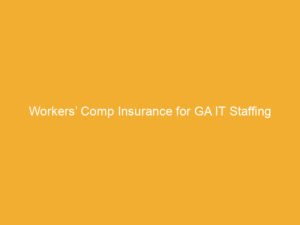
Top Workers’ Comp Injuries in Nursing Homes and How to Prevent Them
August 2, 2025
Coverage Options: Temporary Employment Agency Comp
August 3, 2025

A diverse group of professionals posing in a work environment.
In the dynamic landscape of the information technology sector, staffing agencies in Georgia play a critical role in connecting skilled professionals with organizations in need. However, alongside the opportunities for growth and innovation, these agencies face unique operational risks-particularly when it comes to employee safety and liability. Workers’ compensation insurance emerges as an essential safeguard, providing financial protection for both the agency and its workforce in the event of workplace injuries or illnesses. This article delves into the importance of workers’ comp insurance tailored specifically for GA IT staffing agencies, outlining regulatory requirements, coverage considerations, and best practices to ensure compliance and optimal risk management in a competitive market.
Table of contents
- Workers’ Compensation Requirements for IT Staffing Agencies in Georgia
- Assessing Risk Factors Unique to IT Staffing and Their Impact on Workers’ Comp Premiums
- Implementing Best Practices to Minimize Workers’ Comp claims in IT Staffing Environments
- Choosing the Right Workers’ Compensation Provider for Georgia IT Staffing Firms
- Q&A
- The Conclusion
Workers’ compensation Requirements for IT Staffing Agencies in Georgia
Key compliance aspects include:
- Securing a valid workers’ comp insurance policy specifically covering staffing operations.
- Ensuring coverage extends to all IT professionals placed onsite at client locations.
- Timely reporting of any workplace injuries to the insurance carrier and state authorities.
- Maintaining employee records and insurance certificates for auditing purposes.
| Criteria | Requirement |
|---|---|
| Employee Coverage | All staffing placements, including contractors |
| Registration | Mandatory with Georgia State Board |
| Injury Reporting | Within 10 days of incident |
| Insurance verification | Provide proof to clients upon request |
Assessing Risk Factors Unique to IT Staffing and Their Impact on Workers’ Comp Premiums
IT staffing agencies face a distinctive set of risk factors that influence their workers’ compensation premiums. Unlike traditional industries with obvious physical hazards, IT staffing primarily deals with ergonomic injuries, repetitive strain disorders, and mental health challenges stemming from high-stress environments. Additionally, the placement of temporary IT professionals across diverse workplaces adds complexity, as risk exposure varies considerably between client sites. Insurance providers carefully evaluate these unique risks,often scrutinizing the types of roles staffed,contract lengths,and the safety protocols implemented both internally and at client locations.
Key considerations that impact premiums include:
- Frequency and nature of reported ergonomic and repetitive motion injuries
- Employee turnover rates and temporary worker classifications
- Reliance on remote work, which could reduce or shift certain injury risks
- Implementation of workplace safety training specifically tailored for IT professionals
| Risk Factor | Impact on Premium |
|---|---|
| High turnover in contract assignments | Moderate increase due to inconsistent training |
| Remote work adoption | Potential decrease from reduced physical injury claims |
| ergonomic injuries | Important driver of premium costs |
| Client workplace safety standards | Varied impact; higher risk client sites raise premiums |
Implementing Best Practices to Minimize Workers’ Comp Claims in IT Staffing Environments
Additionally, fostering a culture of health and wellness can mitigate claims related to repetitive strain injuries and mental health conditions common in the IT sector. Consider these key strategies:
- Ergonomic workspace design: Adjustable desks, supportive chairs, and proper lighting.
- Stress management programs: Mindfulness workshops and flexible work schedules.
- Early intervention policies: Swift response to reported discomfort or injury.
- Clear return-to-work plans: Modified duties to facilitate recovery without compromising productivity.
Choosing the Right Workers’ Compensation Provider for Georgia IT Staffing Firms
Selecting a workers’ compensation provider tailored to the unique needs of Georgia IT staffing firms requires careful evaluation of several key factors. Prioritize providers who demonstrate a deep understanding of the fast-paced and dynamic tech industry, ensuring that your policy covers the specific risks associated with IT roles. Look for carriers offering flexible coverage options, competitive premiums, and responsive claims management.Additionally, verify that the provider complies with Georgia state regulations and offers seamless integration with your existing HR and payroll systems to streamline administrative processes.
When comparing potential providers, assessing their financial stability and customer service reputation will safeguard your firm against future uncertainties. Below is a simple overview of essential criteria to consider:
| Criteria | Importance | What to Look For |
|---|---|---|
| Industry Expertise | High | Experience with IT staffing and tech sector risks |
| Coverage Adaptability | High | Customizable policies matching workforce dynamics |
| Claims Processing | Medium | Efficient, transparent claim handling |
| Premium Pricing | High | Competitive rates without sacrificing quality |
| Regulatory compliance | Critical | Full adherence to Georgia workers’ comp laws |
- Evaluate provider responsiveness through client testimonials and industry reviews.
- Verify policy limits to adequately protect both your employees and your firm.
- Consider digital tools offered by the provider to simplify claim submissions and reporting.
Q&A
Q&A: Workers’ comp Insurance for GA IT Staffing Agencies
Q1: What is Workers’ Compensation Insurance and why is it essential for IT staffing agencies in Georgia?
A1: Workers’ Compensation Insurance provides medical benefits and wage replacement to employees who are injured or become ill due to their job. For IT staffing agencies in Georgia, this coverage is essential as it protects both the agency and its placed employees from potential financial liabilities arising from workplace accidents or occupational illnesses.
Q2: Are IT contractors placed by staffing agencies in Georgia required to be covered by Workers’ Compensation Insurance?
A2: Yes. In Georgia, staffing agencies are generally responsible for providing workers’ compensation coverage for the employees they place, including IT contractors. This coverage ensures compliance with state laws and safeguards the agency from costly claims.
Q3: How does workers’ compensation for IT staffing agencies differ from traditional employers’ coverage?
A3: IT staffing agencies often place employees at various client sites with different workplace conditions and risks. This variability requires specialized workers’ comp policies that can cover claims originating from multiple work environments, often necessitating tailored risk management and underwriting.
Q4: What factors influence the cost of workers’ compensation insurance for IT staffing agencies in Georgia?
A4: Premium rates are influenced by several factors, including the number of employees or contractors placed, payroll amounts, job risk classifications, claims history, and the geographical location of work assignments. Agencies with strong safety programs and low claim rates may benefit from lower premiums.
Q5: Can a Georgia IT staffing agency be held liable if an employee gets injured at a client’s workplace?
A5: Yes.The staffing agency is generally responsible for workers’ compensation benefits irrespective of where the injury occurs.Proper coverage ensures injured workers recieve timely benefits and shields the agency from personal injury lawsuits.
Q6: What steps should GA IT staffing agencies take to ensure adequate workers’ comp coverage?
A6: Agencies should:
- Work with insurers specializing in staffing industry risks
- Maintain accurate employee and payroll records
- Classify workers appropriately based on job duties
- Educate clients about reporting workplace injuries promptly
- Implement robust workplace safety and return-to-work programs
Q7: Are there any regulatory requirements specific to Georgia for workers’ compensation insurance in the staffing sector?
A7: Yes. Georgia law mandates that employers, including staffing agencies, carry workers’ compensation insurance if they have three or more employees. Agencies must also comply with reporting and claims procedures as outlined by the Georgia state Board of Workers’ Compensation.
Q8: How can a GA IT staffing agency manage risks related to workers’ comp claims?
A8: Effective risk management includes conducting thorough client assessments to understand workplace hazards, providing safety training, maintaining open communication channels for injury reporting, and partnering with insurers that offer claims management support tailored to the staffing industry.
Q9: What benefits do IT staffing agencies gain from investing in comprehensive workers’ comp insurance?
A9: Beyond regulatory compliance, comprehensive coverage reduces financial exposure from workplace injuries, enhances agency reputation, improves client trust, ensures employee welfare, and fosters long-term business sustainability.
Q10: Where can GA IT staffing agencies find specialized workers’ compensation insurance providers?
A10: Agencies can consult with insurance brokers experienced in the staffing industry, contact the Georgia State Board of Workers’ Compensation for guidance, or explore providers that offer customized policies designed to address the unique risks associated with IT staffing.
The Conclusion
securing comprehensive workers’ compensation insurance is essential for Georgia IT staffing agencies to mitigate risk, ensure regulatory compliance, and protect both their workforce and business operations. By understanding the unique challenges faced in the IT staffing sector and partnering with experienced insurance providers, agencies can tailor coverage to meet their specific needs.Ultimately, investing in the right workers’ comp insurance not only safeguards employees but also supports long-term business resilience and growth within Georgia’s competitive technology landscape.
“This content was generated with the assistance of artificial intelligence. While we strive for accuracy, AI-generated content may not always reflect the most current information or professional advice. Users are encouraged to independently verify critical information and, where appropriate, consult with qualified professionals, lawyers, state statutes and regulations & NCCI rules & manuals before making decisions based on this content.

